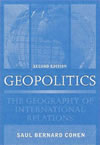Introducing Saul Cohen
 Professor Saul Cohen is University Professor Emeritus at Hunter College and the City University of New York. He is also Editor of the Oxford World Atlas, among other positions. Professor Cohen obtained his PhD at Harvard University and is specialised in geopolitical theory and political geography. He has written extensively about political and economic geography, Israel and Middle East geography, education and environmental perception. In 2008, the second edition of his book “Geopolitics: the Geography of International Relations” was published.
Professor Saul Cohen is University Professor Emeritus at Hunter College and the City University of New York. He is also Editor of the Oxford World Atlas, among other positions. Professor Cohen obtained his PhD at Harvard University and is specialised in geopolitical theory and political geography. He has written extensively about political and economic geography, Israel and Middle East geography, education and environmental perception. In 2008, the second edition of his book “Geopolitics: the Geography of International Relations” was published.
Professor Saul Cohen argues in this Geopolitical Review that 2011 was not about a single development. Instead, “the significance of 2011 is that a number of events converged to make for dramatic change.” Professor Cohen focuses on US foreign policy, but also puts various events in a global perspective. Moreover, he explains why recent events are important for how world politics will evolve in the next decades.
Another contribution to the Geopolitical Review 2011 is Andrea Teti: 2011 – Egyptian Uprising, Regime Change, Muslim Brotherhood
Geopolitical Review
Events that confirmed the end of America’s role as the world’s dominant power
The year 2011 was marked by the convergence of events that confirmed the end of America’s role as the world’s dominant power. Even though a multipolar geopolitical world had emerged by the onset of the 21st century, the George W. Bush administration continued to behave as though it were still the global hegemon. It plunged into wars in Afghanistan and Iraq while lowering taxes and without a long term occupation strategy. Lulled by the rapid success of the 1991 Gulf War, Washington was convinced of the invulnerability of its armed forces. Consequently it placed the burden of fighting upon volunteers and contractors, rather than adopting universal military service.
In Eastern Europe, the U.S. proposed to install an American ABM shield designed against Iran’s missile threat, without gaining a consensus from its NATO allies as to either its need or location. Its negotiations to locate it in Poland and the Czech Republic failed. Nor did it try to find common ground with Russia, which feared the location of the shield near its borders. Recently the project has been recast as a U.S.-NATO undertaking, and the location has been shifted to Romania and Turkey – less of a threat to Russia, but Moscow still objects. In a significant diplomatic setback during 2011, Washington’s efforts to prevent Iran’s development of nuclear weapons through stiff sanctions were weakened by Russian and Chinese vetoes in the Security Council.
During its first two years, the Obama administration made few significant foreign policy changes. Indeed it added troops in the Iraqi ‘surge’ and then expanded U.S. forces in Afghanistan. The events of 2011, however, have pressed the administration to set more realistic foreign policy goals and strategies, in spite of the political obstacles posed by Republican presidential candidates and Congressional leadership who cling to the notion that America can and must remain the world’s leader.
Arab Spring, Iraq, Afghanistan, Pakistan, Israel, Libyan rebels and NATO
The significant events that have marked 2011 as the year of major geopolitical change with significant consequences for the U.S. include the following:
- The Arab Spring, which toppled American- supported dictatorships in Egypt, Tunisia and Yemen, has challenged the regime in Bahrain, weakened the monarchies in Jordan and Morocco, and sparked the Civil War in Syria.
- While U.S. troops will be withdrawn from Iraq by December 31, 2011, there is little confidence that Baghdad will not be plunged into civil war or become a Shiite-dominated state closely tied to Iran.
- The future of Afghanistan after the proposed withdrawal of all Western forces in 2014 is in the hands of a corrupt and incompetent government that is asking for a decade of financial support following the withdrawal. In the meantime, Kabul, backed by the United States, is pursuing on-and-off negotiations with the Taliban that could lead to a Taliban return to power within an Afghan governance system. Pakistan’s ambivalent position on Afghanistan, and the fact that the Afghan Army on which the United States is counting to stabilize the country, is led and heavily composed of Tajiks, rather than Pashtuns, do not auger well for future peace. The aftermath of the American ‘victory’ may well be a return to the status quo ante of a failed state supported by the drug trade and controlled once more by the Taliban.
- The widening rift between the United States and Pakistan over the latter’s harboring of Islamic militants within its border may turn out to be the most disastrous consequence of America’s war in Afghanistan. While Osama bin Laden has been killed and the ranks of Al Qaeda have been decimated, the Haqqani network has replaced them, mounting terrorist attacks from the bases in the Pashtun lands of Western Pakistan.
- America’s failure to persuade Israel to engage in negotiations with the Palestinian Authority that could lead to a two state solution is a reflection not only of Israel’s right-wing nationalists and religious opposition to ending Israeli occupation of the West Bank. It is also due to the support of Israel’s policies by American Jewish and Evangelical lobbies that prevent Washington from bringing pressure on Israel to engage in negotiations.
- The lead within NATO taken by France and Britain in support of the Libyan rebels who overthrew the Qaddafi regime demonstrated that Washington recognized the primacy of Europe’s strategic interests in North Africa. While American involvement was important, Washington took a backseat in the military campaign. Europe’s primary role in this operation, is an important milestone in shifting NATO from an American satellite to one that can become a genuine Trans-Atlantic partnership.
US foreign policy and Asia-Pacific Rim, Latin America, Europe and Middle East
The current dysfunctionality of the American political system has exacerbated Washington’s inability to deal with the deep economic recession and high unemployment rate that plague the country. Pressures to balance the federal budget have already led to Pentagon budget cuts and more are in the offing. These are now forcing the administration to reconsider its military strategic and foreign policy priorities, and a new pattern is emerging that places greater focus on three regions.
These changes include the following:
- Washington has declared that the Asia-Pacific Rim is of vital strategic importance and indicated that it will build up its naval air and land forces to defend its Trans-Pacific allies in response to China’s assertive claims to control the South and East China Seas. Stationing a Marine brigade in Australia is an important American symbolic gesture of its commitment to remaining a Trans-Pacific power. The intention to increase the number of war ships in these seas is a more direct challenge to the Chinese. Secretary of State Clinton has made clear that the combination of trade ties, reinforcement of alliances and the pursuit of democracy is of the highest priority and that America’s future is linked to the future of the Asia-Pacific Rim.
- The declining influence of the United States in Latin America, a region long regarded as America’s backyard, has generated deep concern in Washington. While US participation in the drug war in Mexico has been vigorously pursued, and free trade agreements with Colombia and Panama have been concluded, there are other concerns which await aggressive attention. These include addressing the deep poverty of Guatemala and Honduras, reversing the disintegration of the Organization of American States, endangered by the threat to withhold funding by Brazil, Venezuela and the Republicans in the U.S. Congress. Expansion of Hugo Chavez’s Bolivarian political revolution, which embraces Venezuela, Bolivia and Ecuador in the Andes, and Cuba, Dominica, St. Vincent, Antigua and Nicaragua in the Caribbean, has been contained. However, Venezuela and Nicaragua have recently launched a new economic bloc entitled The Community of Latin American and Caribbean states. It includes 33 Latin American countries and excludes the U.S. and Canada. While prospects for this becoming a significant trade bloc are low, American efforts to reassert its economic presence throughout the Western hemisphere need to be stepped up. The key to such efforts will be the strength of America’s bonds with Brazil, which is not only Latin America’s strongest regional state, but also an emerging global power and a major source for future oil exports to the United States.
- The strategic alliance with Europe needs revamping. The United States and the European Union are inextricably bound economically, culturally, politically and militarily. However, the partnership is asymmetrical. The U.S. has relieved Europe it of its need to bear its share of NATO’s defense burdens, and to become a genuine partner by assuming political responsibility for some of the Alliance’s strategic decisions. While Washington has in recent years prodded the Europeans to invest more in the defense system, it has done so with too little attention to Europe’s strategic and economic interests with respect to Russia, and its opposition to support of admission of Georgia and Ukraine to NATO.
- Events of 2011 suggest that America’s interest in trying to remain as the dominant external power within the Middle East is coming to an end. The need for the United States to rely upon oil from the region is rapidly declining, with only 15 to 18% of all oil imports now coming from there. New oil and gas fields in Canada, the Arctic slope, Brazil and West Africa, shale gas in the United States and alternative energy resources suggest that oil will no longer be the determining factor in American Middle East policy. Instead the powers positioned to be the main external influences in the region are China, Japan and India, which will be increasingly dependent on the region’s oil, as well as Russia which has major economic and strategic interests in the Middle East. Turkey and Iran also continue to seek to expand their influence within the region.
Conclusion: partner with other Great Powers and selected Regional Powers
Events of 2011 highlight the U.S. need to partner with other Great Powers and selected Regional Powers, and to apply ‘soft’ power as the first recourse in furthering its strategic interests. This is likely to guide American foreign policy in the years ahead, as the international system becomes more strongly balanced. This era is likely to be defined neither as the American nor as the Chinese Century, but as the Global Century.
